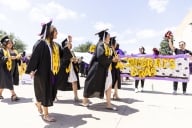You have /5 articles left.
Sign up for a free account or log in.
I’d like to have a discussion about analytics. About data. About assessment.
My colleague calls this technique writing for collaboration.
Some questions:
- What is the proper place for learning analytics in the liberal arts context?
- How can we utilize evidence to improve student learning?
- How can we possibly measure student learning if what we really care about is critical thinking abilities amongst our students?
- When we talk about assessment, analytics, and data to improve student learning are we really talking about 3 different things?
- How can we develop a common language and a shared foundational understanding around learning analytics?
- What is the most effective way to create a campus culture of inquiry and experimentation around teaching?
- How do we develop a a set of norms and practices around teaching and learning that align to widely cherished norms and practices around research?
- What steps should we take to where hypothesis testing and evidence-based decision making in course development and teaching constitute standard practice?
- How do we elevate the scholarship of teaching and learning (SOTL) to a similar level of prestige as traditional disciplinary research, and encourage and reward faculty to publish around their own teaching practices?
- What other questions should we be asking as we try to figure out where the potential of analytics to improve student learning fits in with a liberal arts approach to education?
Some thoughts:
- Individual faculty and course instructors should always determine where and how student level learning data and course analytics should be utilized. Analytics should be a tool to answer the questions that they want to answer.
- The goal should be to develop institutional competencies in assessment and analytics. These competencies and resources, much like those in instructional design, should be available to individual faculty to activate at their discretion.
- To the extent possible, faculty should be given resources and time to incorporate data into their course re-design and teaching practices. Much as efforts to work with instructional designers to re-engineer traditional lecture courses to incorporate more active and collaborative learning elements takes considerable time, any intensive use of learning analytics to evolve teaching methods will be a time consuming process.
- Assessment and evidence-based teaching practices to improve learning should be thought of as broadly as possible. Assessment programs should not only follow quantitative methods, but should be open to alternative qualitative research methods to assess improvements in student learning.
- Any assessment program for any course should be faculty initiated and be done so with the goal of improving student learning, not as a tool to evaluate instructor performance.
- It should be recognized that not every course is a good candidate for leveraging analytics to improve student learning. Non-lecture based courses, and courses that are already discussion or seminar based, may not be amenable to the use of learning analytics.
- Any investment in institutional capabilities around learning analytics should be paired with deep skepticism about the role of assessment in teaching and learning. The last place that higher place that higher ed should go is in the direction public secondary schools and their disastrous experience with high-stakes testing.
Some worries:
- I worry about how we are even going to talk about analytics, data, assessment and learning. Assessment is such a loaded term, and there is real concern amongst many faculty about the agendas and motives of those who would like to introduce this conversation on to our campuses.
- I worry that in our excitement about utilizing data to improve student learning that we will focus on the wrong things. That we will focus on what can be quantified and measured, and miss out on the real value of what the best educators do with their students.
- I worry that faculty will perceive any efforts around learning analytics and assessment as initiatives that are mismatched to their teaching goals and objectives.
- I worry about how we can stay true to our liberal arts values while simultaneously figuring out how we can appropriately leverage data and analytics to improve student learning.
- I worry about what all my friends and colleagues in the humanities will think about this post.
What are your questions, thoughts, and worries about analytics and the liberal arts?

Want articles like this sent straight to your inbox?
Subscribe to a Newsletter







